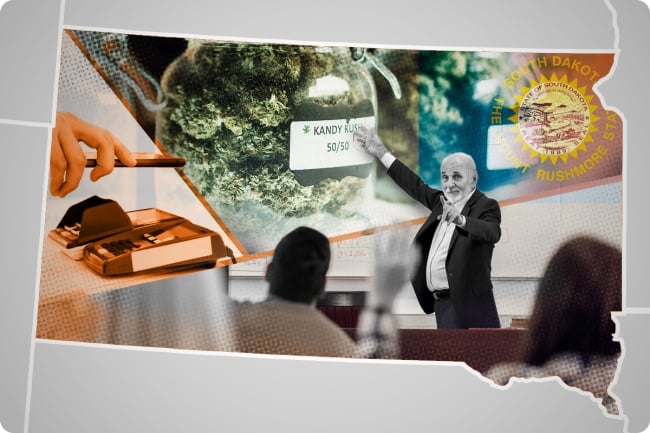You have /5 articles left.
Sign up for a free account or log in.

Photo illustration by Justin Morrison/Inside Higher Ed | Getty Images | Rawpixel | South Dakota
A South Dakota college wants to support the state’s emerging, but controversial, medical marijuana industry by creating an education program for dispensary workers.
Benjamin Valdez, vice president of academic affairs at Southeast Technical College in Sioux Falls, presented the preliminary idea to the state legislature’s Medical Marijuana Oversight Committee earlier this month. The proposed semester-long certificate curriculum would include courses on medical marijuana laws, pharmacology, ethics, compliance in dispensing and a capstone where students would demonstrate their knowledge in an industry setting.
“If we are to ensure the safety of citizens of South Dakota and of this narcotic as it is being dispensed in the form of medication, we are advocating that we look at some form of education for these individuals,” Valdez told the committee.
Although 38 states and the District of Columbia have medical marijuana programs, Valdez said that as far as he knows South Dakota would be the only state to require formal education for dispensary workers if it moved forward with the proposal. Currently, the state’s administrative rules require all dispensary employees to receive training on record-keeping, safety and security protocols, but do not specify any further training requirements.
‘Pushback’ on Medical Necessity
The marijuana education certificate proposal is still in its early conceptual stages, but Valdez said it may help legitimize the cannabis industry. Gov. Kristi Noem has characterized marijuana as a social ill and opposed any form of legalization, though voters approved the legalization of medical cannabis in 2020. According to state data, there are now more than 12,000 registered medical marijuana patients and more than 90 dispensaries in South Dakota.
“When you look at pharmacies across South Dakota that are required to have licensed pharmacists and pharmacy techs that are trained, why not try and provide that similar process for a dispensary,” Valdez told Inside Higher Ed. “There is some pushback in South Dakota about if this is really a medical necessity. How do we balance the two? Being an educational institution, why not use what we do through education to train and develop a stronger workforce in South Dakota and come to the table with solutions.”
While 59 percent of adults across the United States think marijuana should be legalized for both recreational and medical use according to a 2022 Pew Research Center survey, South Dakotans remain divided on their support for the industry.
Voters also approved recreational marijuana in 2020. But Noem authorized a lawsuit brought forth by Highway Patrol Superintendent Col. Rick Miller and Pennington County Sheriff Kevin Thom. It argued for nullification of the recreational marijuana amendment on the grounds that it violated the state’s requirement that constitutional amendments address just one subject. In 2021, the state supreme court sided with the petitioners and overturned the voter-led amendment for recreational marijuana.
Recreational marijuana was on the ballot again in 2022, but voters rejected it. There are currently efforts underway for another recreational cannabis amendment to appear on the ballot in 2024.
While Valdez said he has no position on whether recreational marijuana should be legalized, the political dustup over it pushed him and his colleagues to consider how the college—which is expanding its other health care training program offerings—may help both ease political opposition and support the medical marijuana industry for the benefit of South Dakotans.
“Through education, we can ensure we have those best practices and safety components in place,” he said. “We’ve also looked at how we may provide training to our existing health care programs with this topic. As we’re training nurses, surgical technicians and respiratory therapists, how do you work with a patient and ensure you’re not endangering a patient who may be taking marijuana?”
This fall, the college reported its highest enrollment numbers in a decade, according to a news release. Offering a cannabis education proposal—at Southeast Tech or other colleges in the state—especially if the state required it, “could help with enrollment by all means,” Valdez said.
Beyond enrollment, the college sees the proposal as an opportunity to meet a growing market demand.
“Our focus at Southeast Tech is workforce development,” he said. “We thought this may be a good way to help the workforce.”
Logistics Unclear
Lawmakers had numerous questions for Valdez during the committee hearing, including about the format in which the courses would be delivered and whether current dispensary workers would be required to take the courses, which could temporarily shut down dispensaries while employees earn the certificate.
Valdez told the committee that the college has the capacity to deliver courses in hybrid, virtual and in-person formats and that he’d like to see all existing employees take the courses.
“We’re not advocating either way, but If we’re going to try and make it more viable and more legitimized, why not,” have everyone complete the coursework, he later told Inside Higher Ed. He added that if industry leaders have concerns about education requirements closing dispensaries, he’s open to suggestions on how to avoid disruptions and would “defer to our legislators.”
It’s still unclear whether dispensary employees or owners would pay for the courses. Valdez said those details have yet to be ironed out, but that he wants the certification program to be affordable.
“We wanted to try and make sure that if an individual is taking on this education themselves, it would be federal financial aid eligible,” he said, noting that if it comes to fruition it may qualify for the Build Dakota Scholarship, which covers tuition, fees and other expenses for students pursuing in-demand technical careers.
Char Gamble, CEO of Emerald Consulting which focuses on supporting the cannabis industry in South Dakota, said she’s supportive of the concept of an education requirement but wants to make sure it’s designed to allow some flexibility.
“It can’t be some huge training curriculum that’s going to take a long time to complete and be very expensive because that’s going to be a roadblock to getting people in the jobs,” said Gamble, who also has a doctorate in educational leadership.
And since dispensaries are located all over the state—some are far away from the colleges that could offer the proposed curriculum—“we have to be able to use Zoom and different things to be able to get this material across to people,” she said, and “maybe we compromise and make the program shorter” than a full semester.
Gamble, like Valdez, thinks an education requirement could help legitimize the industry, as well as standardize the education dispensary workers receive.
With no education requirements, an employee’s knowledge about marijuana could vary depending on what their individual employer requires or on the outside education they personally sought.
California-based Oaksterdam University, the self-identified “world’s first cannabis college,” already offers more than 25 courses on various aspects of cannabis and the industry, but there would be advantages to South Dakota’s public colleges delivering that education as opposed to an out-of-state private institution.
“We could have a little more control over the costs, protecting the businesses and students from price-gouging,” Gamble said. “Also, the revenue would come to people in our state.”
Kittrick Jeffries, owner of Dakota Cannabis Consulting and multiple dispensaries in the state, said he already requires 90 days of training for new employees that follow many of the same guidelines in Valdez’s proposal. Jeffries sees both advantages and potential unintended consequences of mandating cannabis education for dispensary workers.
“As a dispensary owner, that would be a wonderful hire because they’ve had hands-on training about marijuana. It would also bring in revenue and create jobs for the local community,” he said. Depending on how the legislation is written, however, “it could cause ripple effects of having to be shut down for six months or limiting your labor pool because not everyone wants to go through the courses.”
Jeffries also questioned where colleges would find instructors to teach these courses and said he’d prefer to see cannabis education offered to medical providers instead of so-called budtenders, who are entry-level employees typically making between $12 and $18 an hour. (Even in states with medical marijuana programs, federal law says doctors can only recommend—not prescribe—it.)
“There is a lot of nuance in helping patients and finding out what products best fit their debilitating conditions. But that relationship goes back to their doctors,” he said. “Higher education should never be mandated for entry-level staff.”
But Brett Johnson, a physician’s assistant who issues South Dakota medical marijuana licenses through High Pines Medical Marijuana Clinic, said that because the federal government still classifies marijuana as a Schedule 1 drug (meaning it has a high potential for abuse and no accepted medical use) traditional medical training doesn’t teach about its chemical properties, dosing and potential interactions like it does for other pharmaceuticals.
“As a medical provider I can’t say a patient should use this much this often because it being illegal on the federal level is blocking us from tailoring it into regular medicine,” he said.
He also doesn’t know what kind of products each dispensary offers.
“We’re going to have to rely on the dispensaries to know exactly what they have on the shelves and how it will help the patients because at this point medicine isn’t taught those things … It would behoove those folks to know what the dosing and regimen is.”
And while he’s supportive of some type of education requirement for dispensary workers, closing the dispensaries while they complete courses isn’t an option.
“We’ve got patients that need this medicine and they need it now,” Johnson said. “We can’t shut it down just for training.”








